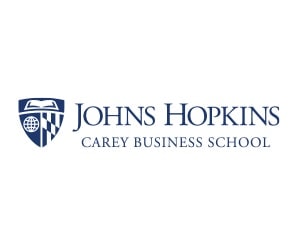 The Johns Hopkins University Carey School of Business has updated their information and I wanted to give everyone a heads up. They’ve really been growing this program and Carey as a business school has been gaining in prominence. I routinely mention this program to students and have a couple of them in the program now. Check out the update and I will work on getting a student review or something else posted on here soon.
The Johns Hopkins University Carey School of Business has updated their information and I wanted to give everyone a heads up. They’ve really been growing this program and Carey as a business school has been gaining in prominence. I routinely mention this program to students and have a couple of them in the program now. Check out the update and I will work on getting a student review or something else posted on here soon.
- The full-time, 36 credit MS in Finance is ideal for students with limited or no professional work experience. Offered at the Carey Business School’s Baltimore and Washington, D.C. campuses, the program places students in an intensive one-year cohort, allowing them to collaborate regularly throughout their coursework.
- The part-time, 36-credit program is designed for working professionals advancing in their careers. Complete the degree in as little as two years, taking classes evenings and weekends at the Carey Business School’s Baltimore or Washington D.C. campuses.
The curriculum for the MS in Finance program includes the following courses, but course sequence and availability of specific electives may vary. Students must consult with an academic adviser to ensure that they take courses in the approved sequence.
- Accounting and Financial Reporting
- Business Communication
- Corporate Finance
- Economics for Decision Making
- Investments
- Leadership Ethics Seminar
- Statistical Analysis
- The Firm and the Macroeconomy
- Derivatives
- Financial Modeling and Valuation
- Fixed Income
- Financial Institutions
- Advanced Corporate Finance
- Advanced Financial Accounting
- Corporate Governance
- Entrepreneurial Finance
- Financial Crisis and Contagion
- Advanced Portfolio Management
- Managing Financial Risk
- Quantitative Financial Risk
The Masters in Finance degree can be undertaken in two locations:
- Baltimore, MD
- Washington, D.C.
Admission Requirements
- 3.0 GPA
- GMAT/GRE (required for full-time; GMAT/GRE may be waived for part-time students with work experience) .
- Several years of progressive work experience
- Analytical/Quantitative background
What is needed to apply:
- Current Resume
- Two letters of recommendation
- One required 500-word essay; Second essay is optional
- Transcript from all universities at which you earned 12+ credits
- $100 application fee
A quick overview of the program and degree provided by the university:
The Johns Hopkins MS in Finance equips you with advanced quantitative skills and familiarizes you with concepts that major financial businesses use to confront and construct their strategies.
It’s a rigorous program geared to students seeking careers in financial analysis, financial management, and financial regulation.
Here, experienced professionals offer expert insight into emerging topics and trends such as global trade dynamics, advanced hedge fund strategies, and investor behavior, giving you the foundation and confidence to deliver superior returns while applying balanced asset management and risk awareness principles. You’ll use cutting-edge technology, financial methodologies, and financial modeling to analyze complex problems in a global context.
The program will also equip you with the skills to:
- Identify, evaluate, and implement capital budgeting processes to maximize shareholder value.
- Expertly assess financial risk and proficiency, especially when future payoffs are uncertain.
- Understand and implement asset allocation strategies and risk management procedures.
- Leverage cutting-edge finance techniques and the resources that support them.
As the world of finance confronts more complex challenges, our graduates are ready to respond and lead.
While our students receive a firm grounding in the essentials of finance, the curriculum also emphasizes the need for creativity, critical thinking, and ethical behavior. You’ll explore concepts such as responsible investing, ethical leadership, and the role of finance in improving people’s lives.
It’s a program designed for a new generation of leaders who are committed to the idea that the financial and holistic health of businesses and communities is critical to long-term, sustainable growth and prosperity.


